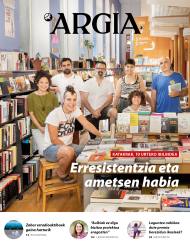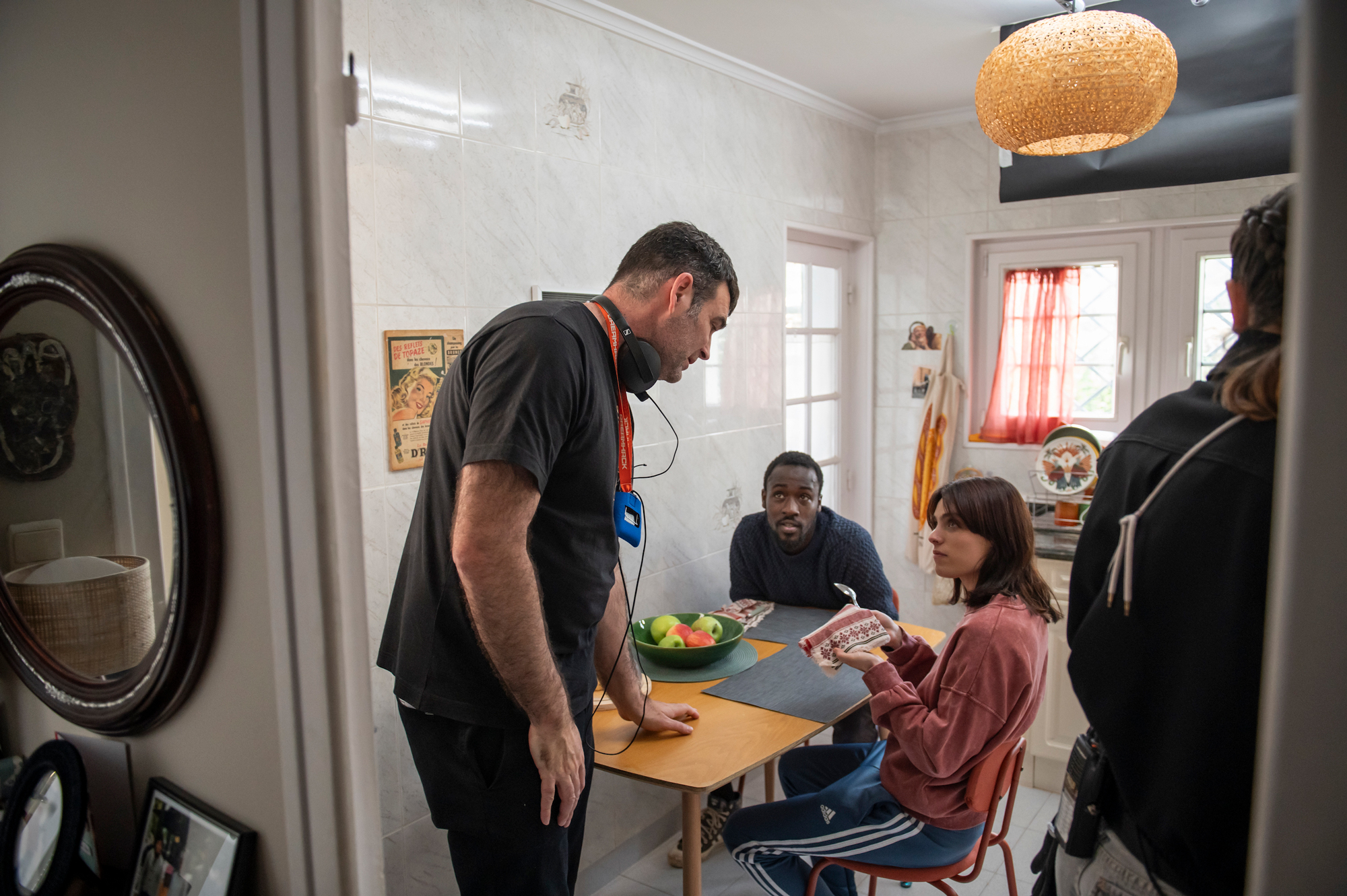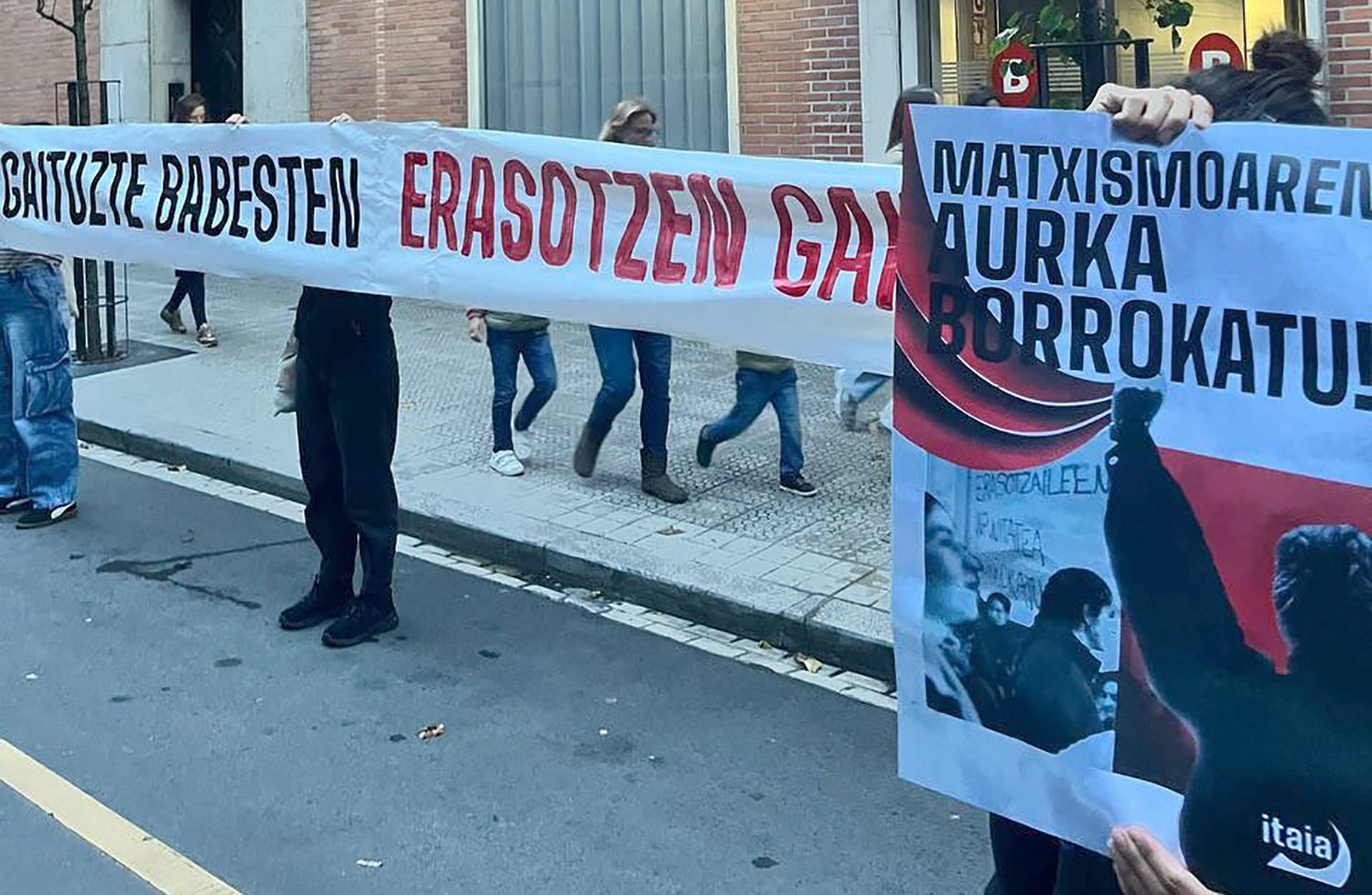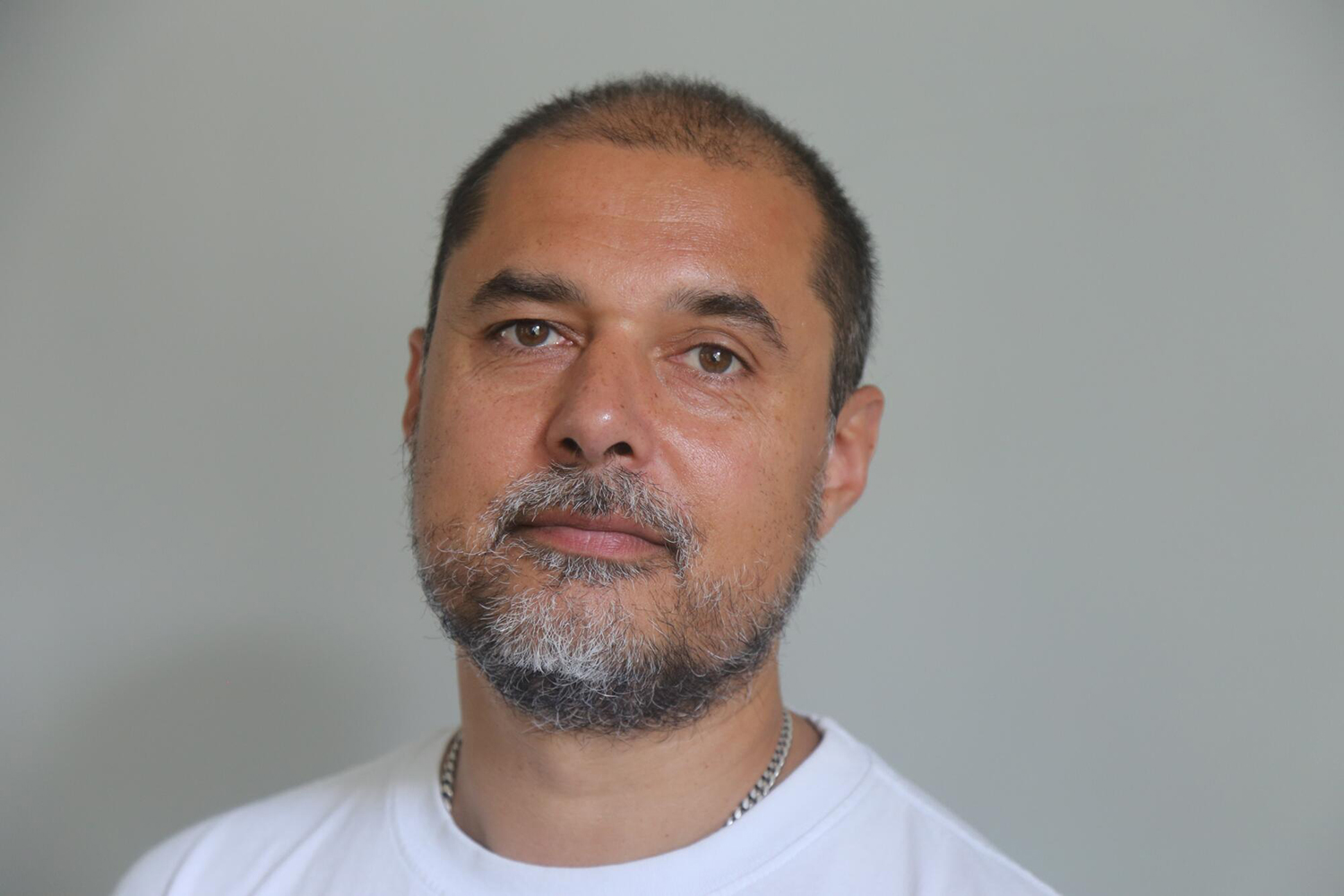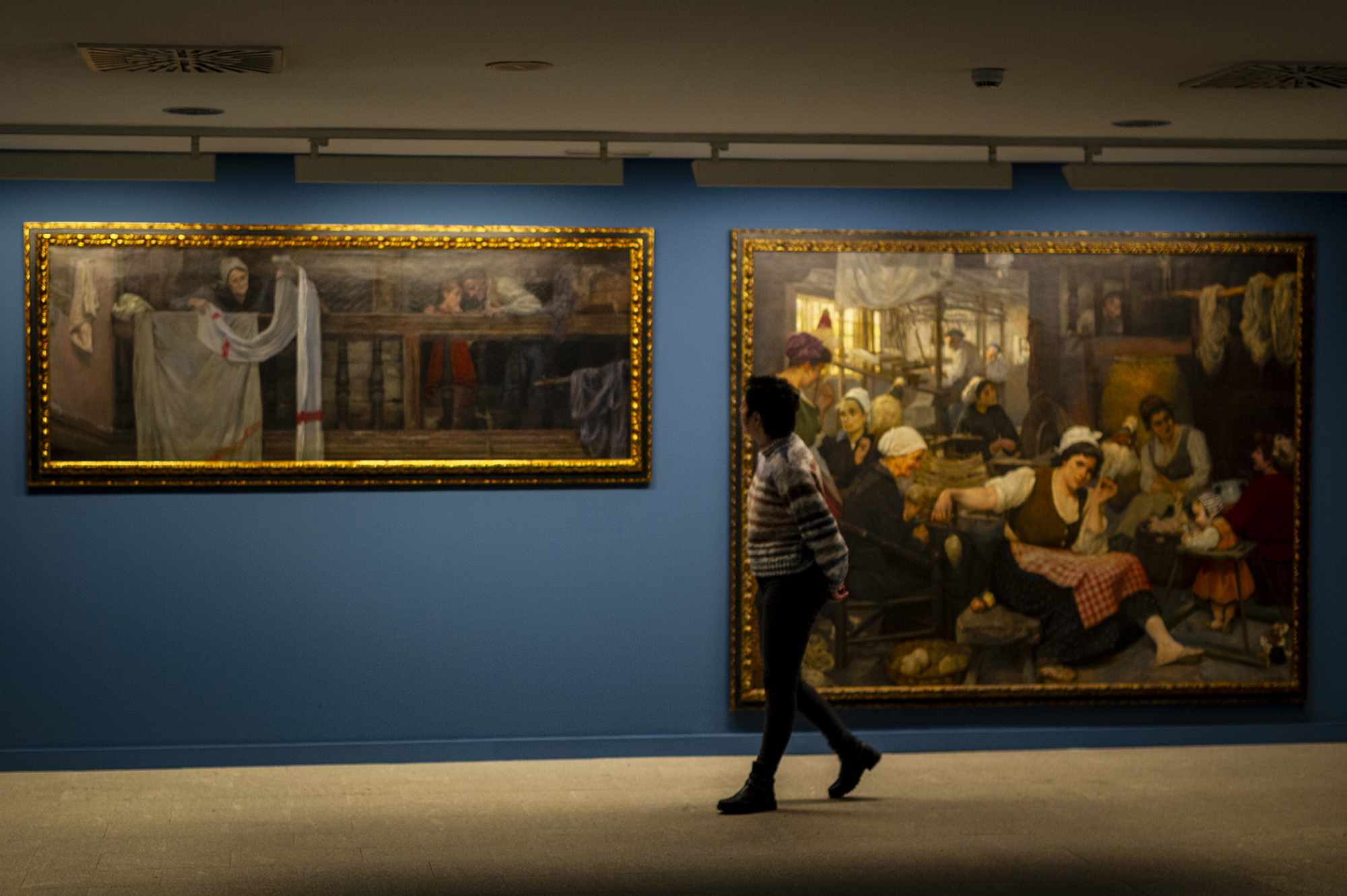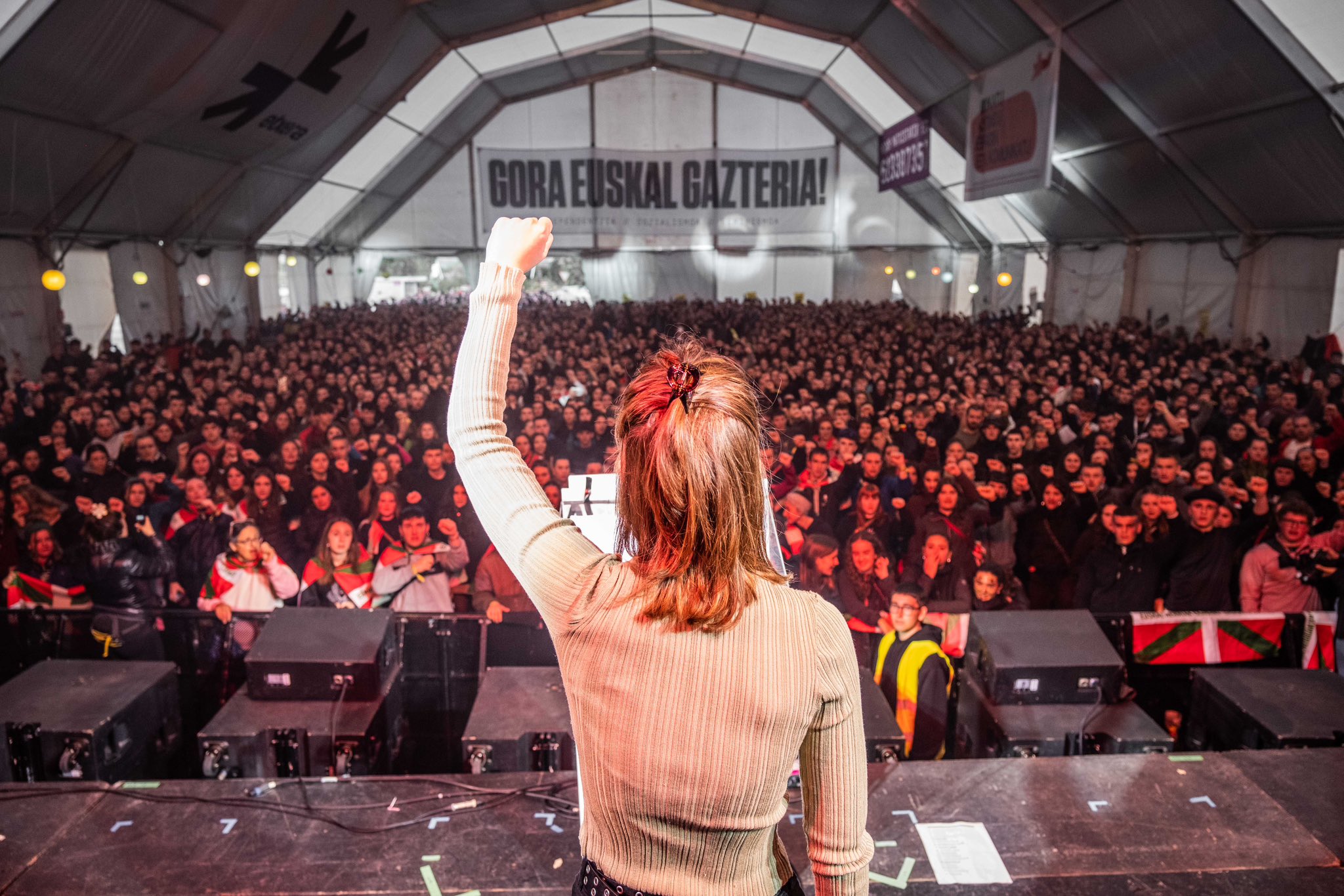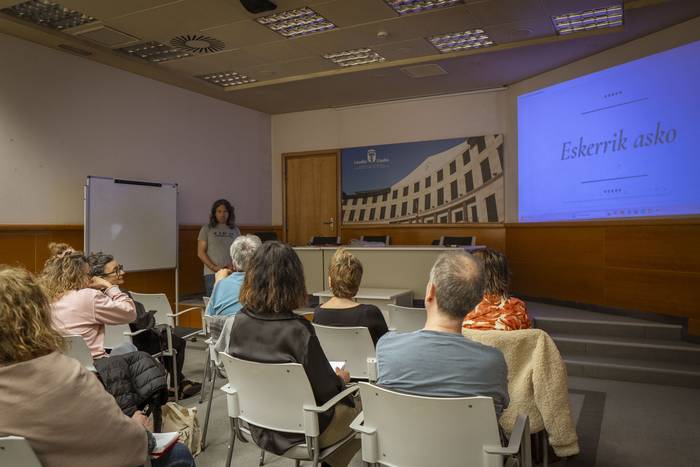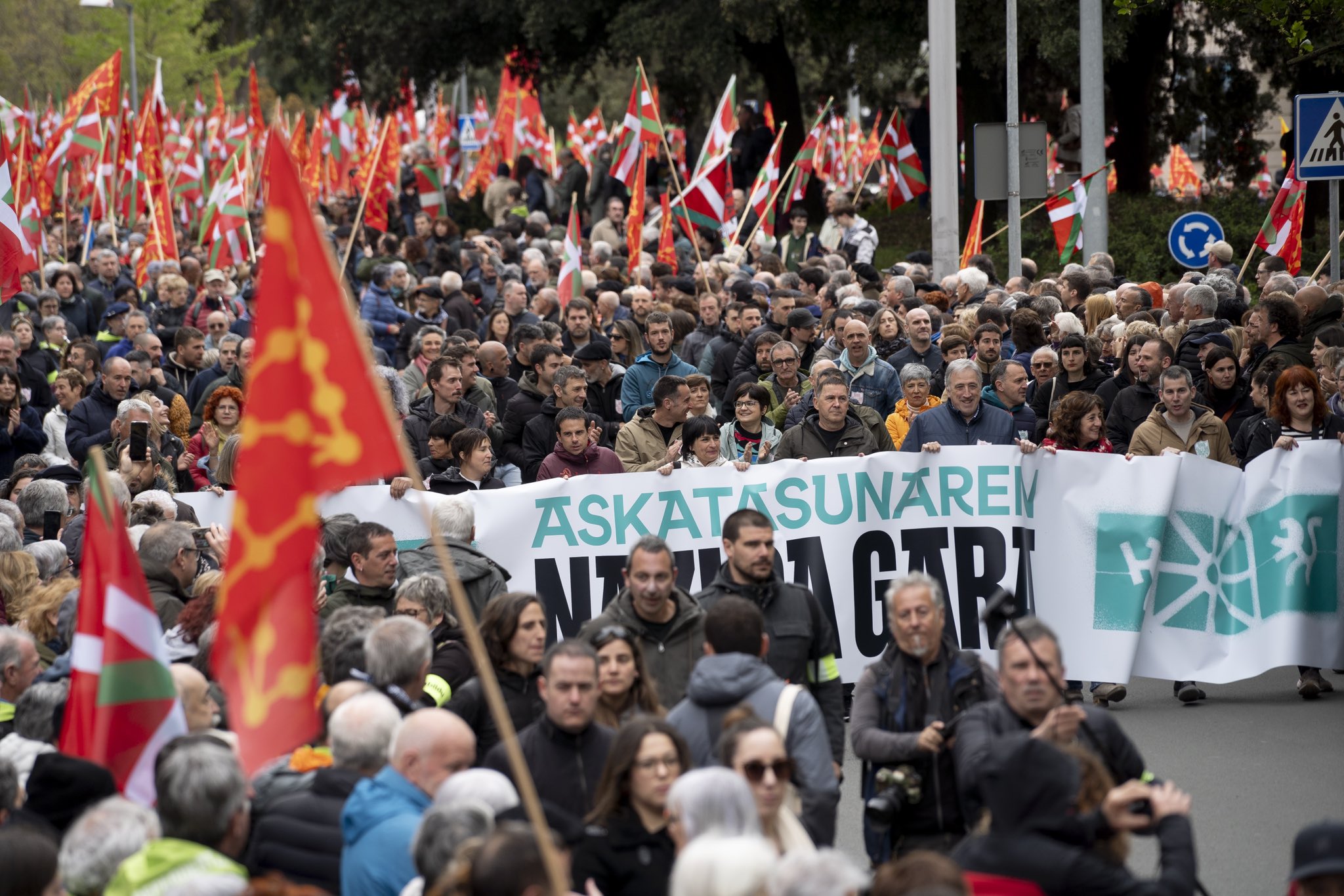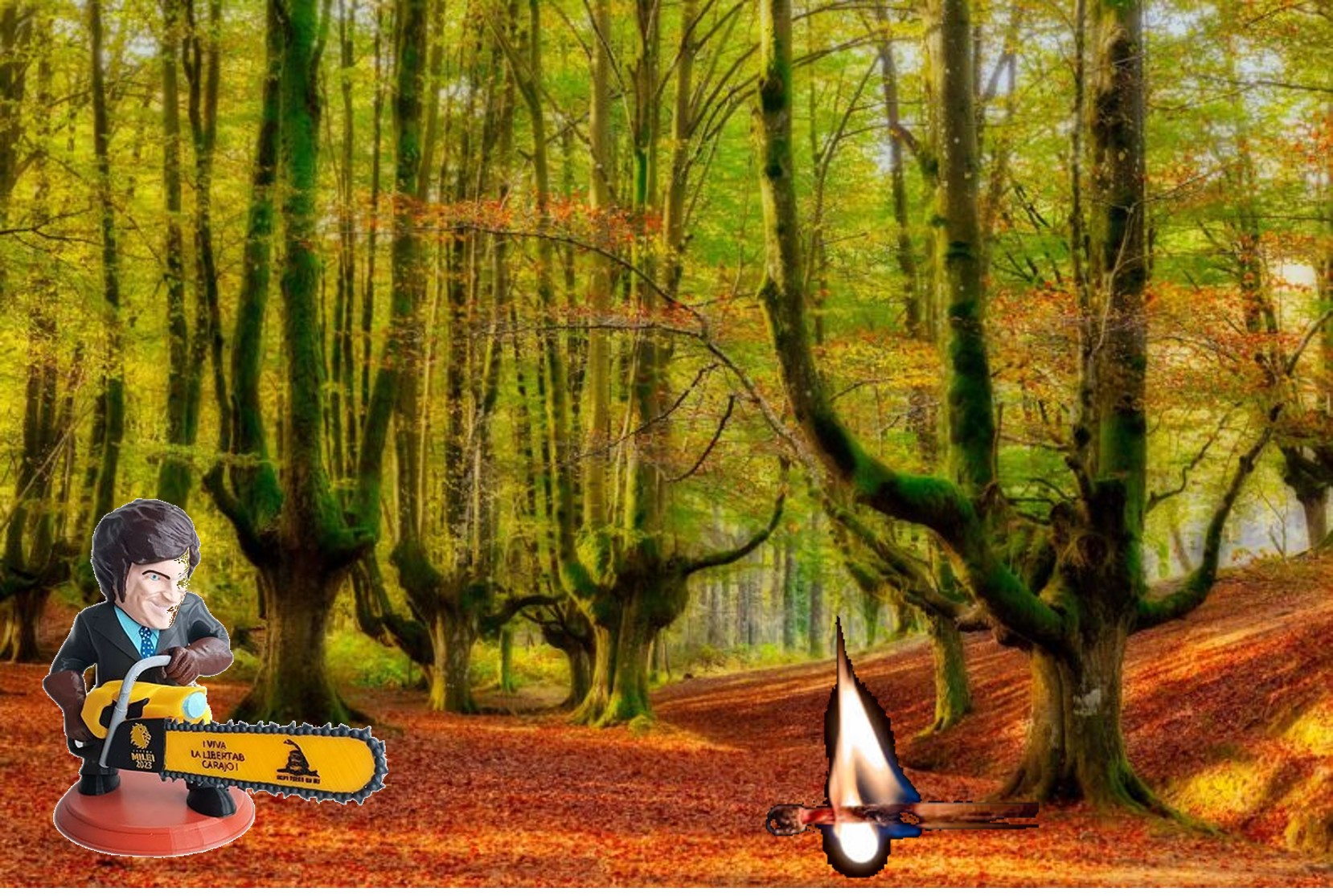Eat, drink, read... change the world
- On 31 December, ten years have passed since the opening by Katakrak of Pamplona of the new spaces for accommodation, library and event room. In 2016, the fourth leg formed the table: editorial. In the County of Pamplona, Katakrak is unique, both because of these spaces and their character. If you want, it has to do with the alternative, with resistance, with dreams. Or just enjoying good organic wine or coffee.
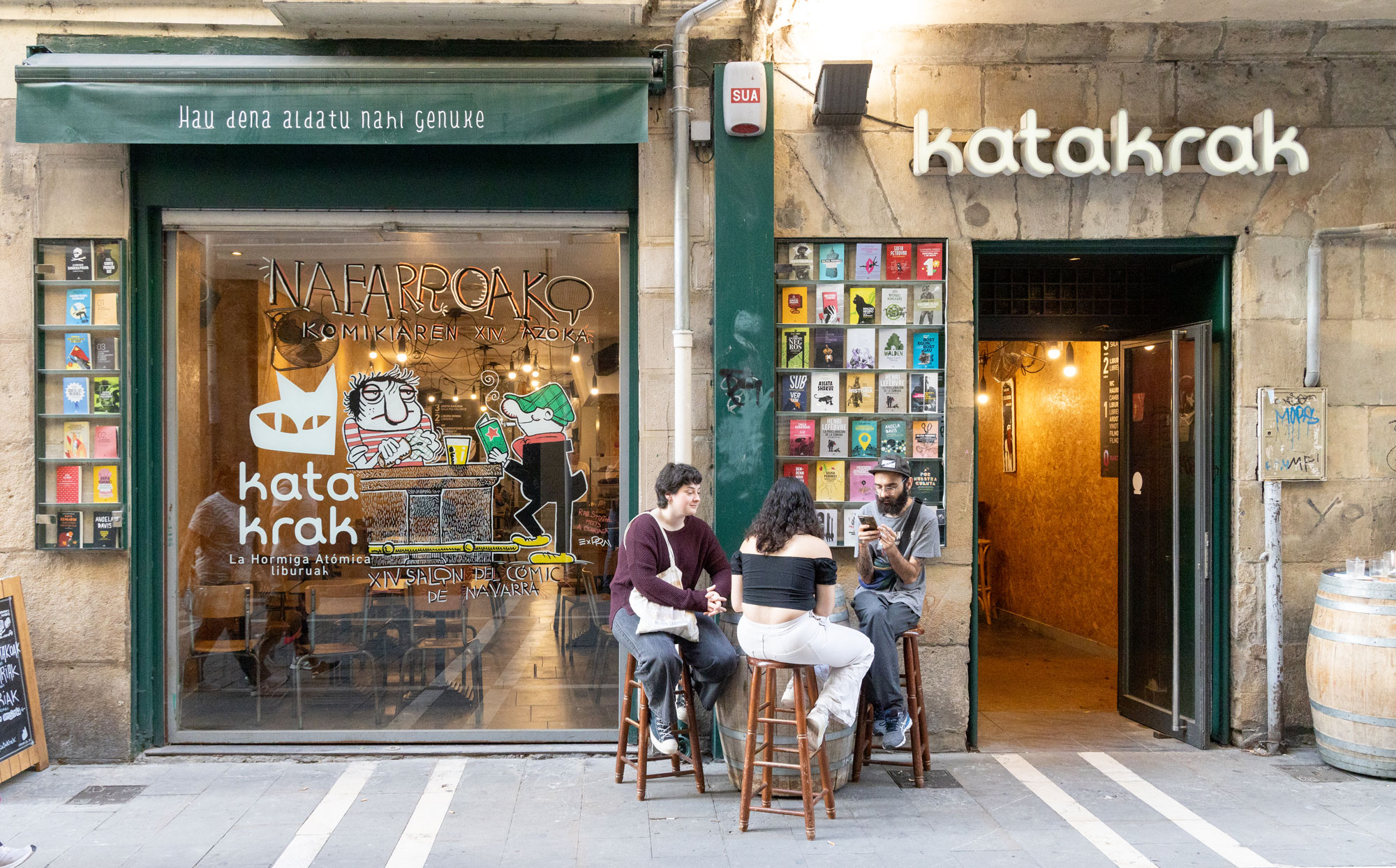
Katakrak is located in the old town of Pamplona, on Calle Mayor number 54. There is always someone in the two exterior vats, and the interior is embroidered at the sunny midday of late August. We entered the accommodation with Nerea Fillat and Hedoi Etxarte. Both are workers and partners of the Katakrak cooperative and are in the pipeline right from the start. It's time to eat and Juan Etxenike is preparing tables. They offer an average of 20 menus per day. It is a three-story building, with canteen and bookstore at the bottom, bookstore at the second and room for about 200 people at the third, where shows, conferences, etc. are organized.
Fifteen people work in Katakrak and eight in the canteen. In fact, the work is divided into areas, but also some of them shared. Fillate dedicates half a day to the editorial and the other half to general structural functions. Etxarte gives half in publishing and half in bookstore. Well, depending on the season, all the performances change: In San Fermín, the majority at the bar, in the Azoka of Durango the group places its strength there and in the bookstore at Christmas.
The project, however, did not start from scratch, was preceded by the Hormiga Atomico library of Calle Curia de Pamplona. He was also compaginating books and accommodation, which was born in 2007 and lasted until 2013. But Curia's thing didn't want anymore, and they started looking for a bigger space. Better said, as in many projects, there was a two-way tension: some wanted to continue in Curia and hold their feet, others grew and continued elsewhere.
They started searching and in 2012 bought the current building. “It was the first secular school in Pamplona and Sarasate [Pablo] and Baroja [Piío] passed here,” says Etxarte. Later it was the sports space where karate was shown and before Katakrak, in the 90s, an art gallery. They needed EUR 1,600,000 to undertake the new project. A lot of money in your eyes. How can we achieve this?
The first pillar was “the militant loan”, that is, asking for money from those who could join the project. 120 people lent EUR 700,000: “It could have gone from EUR 1,000 to EUR 100,000 as a loan, without profit, and at best with interest of 1%.” The second was the loan granted by the bank Triodos. And the third, donations. They got 100,000 euros. They have also been incorporated into the membership figure that, after the pandemic, puts an amount of money a year, and is already about 350. They would like to use this special time of the tenth anniversary to reach 500.
Looking back, as is usual in any popular project, the initial epic appears soon in the conversations. Among them are the auctions held in Baiona, Tours or Bordeaux. Go fast, decide fast and quickly bring things like all bookshelves and canteen chairs from the bookstore. Between 3 and 4 tons of material had to be stored at a Traperos site in Emmaus. Those moments have firmly fallen into Etxarte's memory: “It was hard times. When we opened the catacras we got that one day we made a party, before we worked every day.”
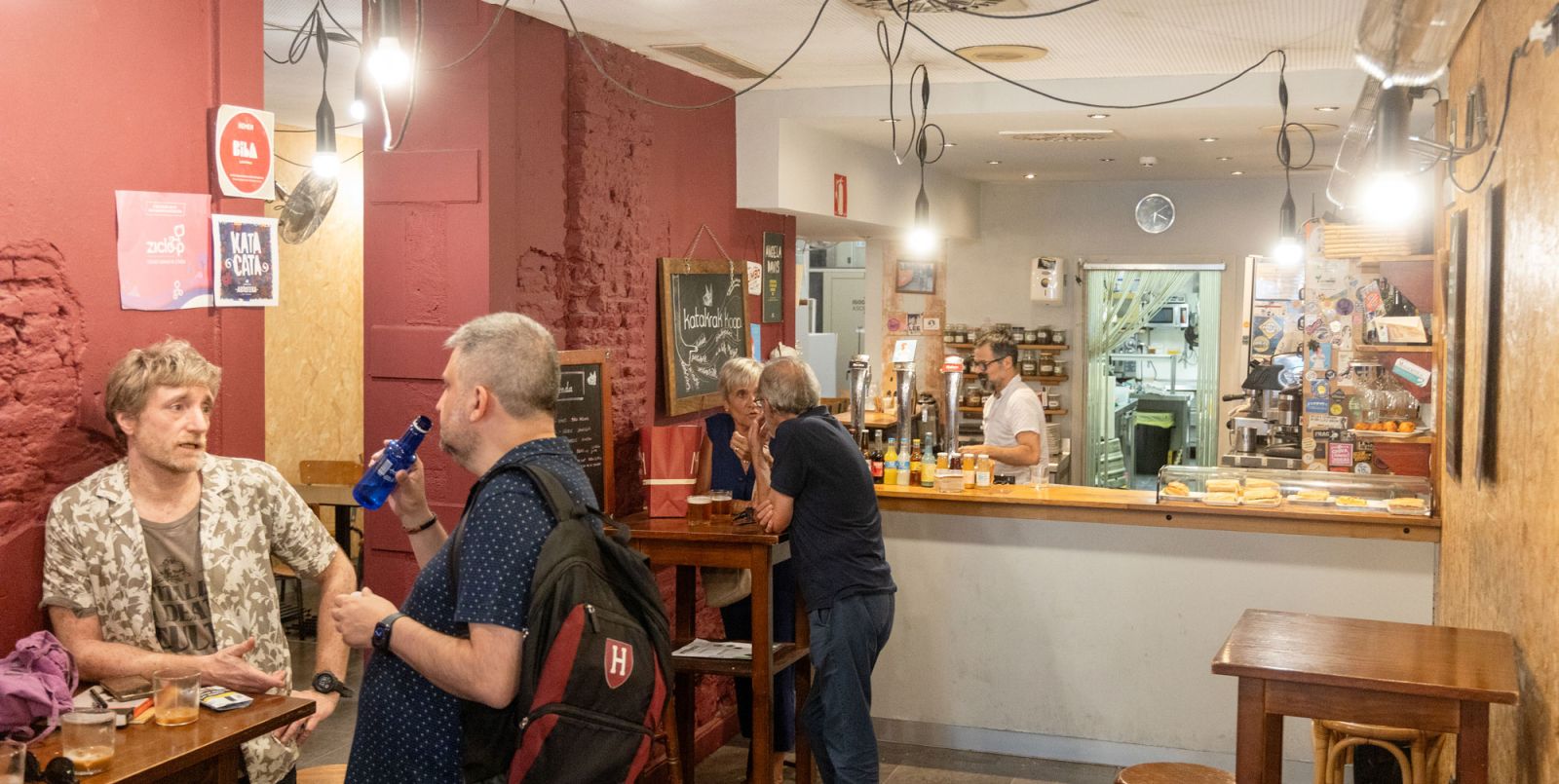
And all of this for what?
Catacras. Strong, representative, onomatopic name. Our heads are over. “Before opening the name, it sparked a long debate,” says Fillat, but there was eventually a broad consensus with Katakrak. Katakrak was a popular movement emerged in the mid-1980s in Pamplona after the occupation of empty houses and premises, and after obtaining the approval of some of his colleagues, the new space started with that name.
Doors were opened and, as usual, you could hear everything in the street: “We can be the space of those around us”, “Something extracted from the 15-M movement”, some of them also participated in the Aranzadi political platform, which in 2015 was part of the government team of the mayor of Pamplona, Joseba Asiron... This journalist has read somewhere that Katakrak “is the bathroom space” and asks Fillat and Etxarte if so. In the frogs of Fillat, “for some we are anarchists and for others we are from Podemos…”, but our group is very different ideologically and here we debate a lot of everything”. “After all – Etxarte has qualified – we have built the agreement on material decisions and not on ideological bases.” His colleague Aitor Balbas, who will later join the interview, also stresses the plurality among them: “Here the most painful are the political debates among us.”
They flee from a single definition. What to do, what to eat, what to buy -- it's you. It can also be a way of expressing what this cooperative is: they have closed the space in all the general strikes that have taken place in Pamplona since its creation; when in 2018 Alternatiben Herria was held in Iruñea, one of the axes of the organization was Katakrak; the commitment to food sovereignty is evident in the canteen meals and drinks, where they can be picked up, for example, the baskets acquired. Biba wines contain only cooperative organic wines. The Coca Cola brand has never been sold. A 17-euro menu costs two less if you claim to be precarious. And on Thursdays you can see young migrants from Lantxotegi playing in it.
In any case, concepts like resistance, transformation, feminism, antifaxism, sexual diversity -- they're dancing in the air after conversations with Katakrak workers. And all splintered with books and reading, they say that “books are key to fostering critical thinking and political imagination.” “Our challenge is to move the collectives and actors that accompany us to radical places,” Balbas stressed.

The background of 25,000
books has come to the project's gem after walking seven stairs: a very dressed, bright and attractive book shop. It's the largest space in the building. Here is another food, but there is no lack of a good breast and to wet the ash organic Navarran wines such as Azpea, Egiarte, Biurko, Mendiko, Aristu or Lezaun are sold. The Anayeta cow reminds us that they want to destroy the Roya Canal and the cartel against the expansion of the Yesa reservoir.
On the big poster at the entrance we see a smoker worker, Karl Marx, whom we have advanced. Young Angela Davis reminds us that “life is the greatest” and the late David Bowie tells us: “What is total happiness? Read.” As we enter the corridor surrounded by narratives, we can see the series of African or Arabian and Persian narratives. “Subversive fiction,” says another title, and the portrait of the brown youth speaks like this: “In the ghetto we brothers read the novel.”
We leave behind the catakrate books, the narrative, the Basque section, the children's literature and the comic book and head to the second floor. We enter the world of politics, philosophy, ideology and religions. But poetry, art, architecture -- they're also there, waiting for them to arrive. In total, the bookstore has a fund of 25,000 books. “It will be one of the largest in Euskal Herria, if not the most grande.Pitell us, only in the theater section we have over 400 books,” says Etxarte.
We continue with Fillat and Etxarte, and under the gaze of thousands of books, we sit at the table on the second floor. “We didn’t start from the void, we brought the essence of 7,000 books from The Atomic Ant,” says Fillate. The six-year experience in La Concrete was decisive for its implementation. The reputation of the library by the departments of politics and philosophy is certainly not that: “We have a single department of philosophy in Navarra, here are also teachers and students from the University of Navarra,” explains Etxarte. However, Fillat stressed that it is a generalist bookstore, “and everything is a specialty.” They say that bookstore is a matter for many people and that maintenance also does: “Customers help us a lot,” says Fillate, “for example, in summer there are a lot of people from outside and we receive a lot of references.”
According to a Navarro newspaper, ten bookstores have been closed in Pamplona in the last two years. “Yes, and others have opened up,” the couple says. They will get angry if they tell them that citizens, and especially young people, do not read. Three people work in this bookstore and the questions come from themselves: And is this profitable? What is most sold? “Certainly everything, but a lot of feminism and children’s literature are sold.” Entering from the canteen to the bookstore, one may think that accommodation will be the sustenance of the bookstore: “The two give,” says Fillat, “both are very balanced from the point of view of business: hospitality has a profit margin of 65% and books 30%.”
However, they want to make something very clear: “The catacras are maintained by the uniqueness of the project, by the commitment of the work team and by the support we have around us, otherwise it would be impossible”. Fillate has left one of the key ideas of the project on the table: “This site is a reference, among other things because it is always open. Having a space that is open for a long time a day is important to earn the reference, and this idea we work from the beginning.”
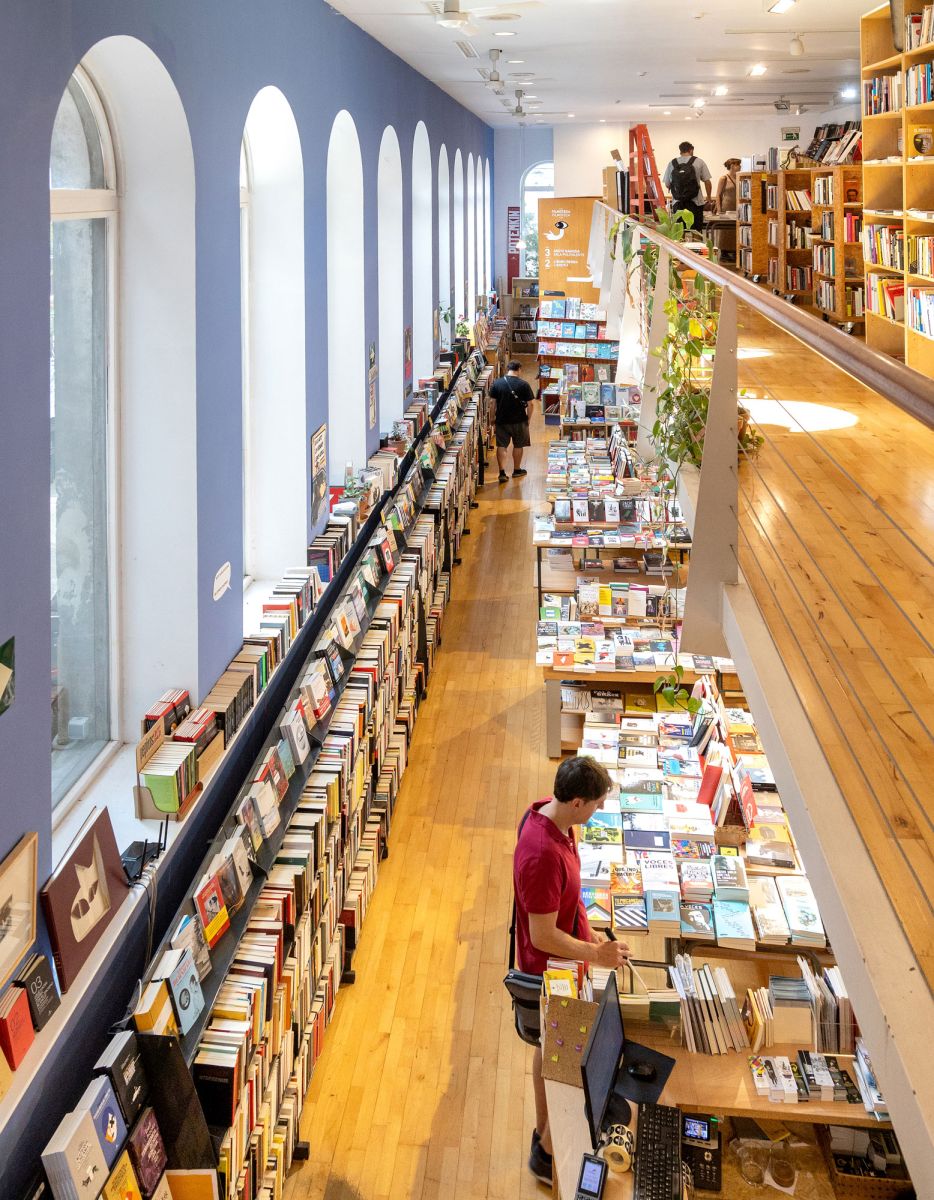
The Editorial of 90 books
was created in 2016 and each year they publish about nine books in Spanish and six in Basque. Along with Fillat and Etxarte, Balbas works there. And they point out an important question. “We have made the editorial after being a bookstore.” This gives them many clues. The essay and narrative regarding gender predominate, highlighting feminism, history, the police and the city in the lines. Etxarte says that Spanish books are more sophisticated: “In the Basque countries there is more flexibility, they are more classic texts, but also more radical, the themes and books that have been discussed in society for some time in Spanish are being published in Basque”.
This year they've had their first problem with a book published, the dirty Whore in a bookstore in Baiona. All books fighting for the rights of sex workers were attacked by an “integrist and transfob team”. It is also deepening in the police line, which will soon be published in the fourth book, and Etxarte believes that “sometimes that also gives me respect”. And what does it sell? Fillat speaks in hairless mouth: “No, not everything is sold and, for example, feminism is one of the most important supports for us.”
Many of these books are perfectly seen in the exhibitors expressly placed. And the theme of the exhibition opens up another melon: what, where and how to show it in the bookstore. Fillat: “There is increasing pressure from the big publishers to make their things as spectacular as possible, now they come with a tower, a counter, posters or price drops. It is a weekly fight, and no, we want to make it clear: we will decide what to show.”
On the ground floor the silence has been made, the bookstore has been closed. We keep talking above, Fillat and Etxarte are two flowing words, and the questions and answers happen. But there is fatigue in the air and the journalist still wants to know a lot about the soul of the project, the internal organization, the work, the satisfaction of the workers... that also provide key information about the project. It asks them to meet with a group of workers and to do so. Today is Wednesday and next Monday.

That complex soul is
Goize, the canteen is still closed and there we have met six people: Fillat and Etxarte have joined Izaskun Mata, Maitane Unzu, Juan Etxenike and Aitor Balbas. Mata started working in Katakrak in 2019 and the rest is in the pipeline from the start. Fillat and Balbas Eguzki Videos worked earlier on the project, with which ARGIA collaborated several times. Etxenike came from Greece, and is going to return there soon, Unzu received in 2013 an invitation to join the project in Pamplona and Izaskun was studying Fine Arts in Bilbao at that time. Studying in Vitoria, Etxarte settled in Pamplona after eight years.
Everybody agrees: sometimes it's hard, but they know what they do and they're thrilled in Katakrak. As Drugs insists in their concerts, Mata sums up firmly “at ease”: “You see that your working hours, in addition to money, give something more. We are a tool for city partnerships.” In Balbas’ words, “life, politics and work, here everything is combined, but unlike our friends, we have to organize life differently.” For Fillat, “this work makes a lot of sense to our lives. With all its complexity, but it allows us to be quite close to happiness.”
“A friend once asked me what he was doing,” says Etxenike, “I serve cafes,” I replied. Here are a lot of people who come together and see meetings and talk about projects. They have nothing to do with us, but Katakrak uses it, now they create a video clip and then they make posters about violence against women.” Etxarte is also clear: “Working here is a great luxury. In the logic of the world in which we live everything is against. It’s like doing something forbidden.” “But don’t forget – Unzu adds – that the team is over fifteen members here. And yes, it’s hard, here we spend a lot and personal life sometimes suffers.”
How to reconcile professional work with militancy? Nor does the ARGIA journalist miss the question. Fillate replies: “Sometimes we suffer, and that contradiction is on the table. With our limitations, we respond collectively to that. What is care? It is closer to what we do among ourselves than to what is done outside here.” But for many reasons, including the political and ideological plurality of colleagues – says Balbasek – tensions also arise that we channel through general agreements and with a philosophy: ‘live and let live’.

Katakrak workers have a salary of 1,300 euros Hospitality Convention and all have the same base salary, 1,300 euros per month and 14 annual pay. Every public holiday has the canteen closed and six weeks of holidays a year, two more than in agreement. And they also mention the key question, the horizontality: “Power is well distributed.”
The decision is divided into three layers. The first group the working groups that manage bookstore, canteen and publishing by area. The second is the congress of the cooperative, which meets weekly and involves non-member workers every two weeks. And the third is the general assembly, which groups together the cooperative plus those who are seriously working with the project, getting to take on their debts, for example, or working at various times of the year, depending on the needs, but generally meets about four times a year, always on Sundays, all day. A new meeting with the extensive network of Katakrak partners is also held once a year. There is also no lack of black clouds, otherwise they would be alien: they say that hospitality is tough and that people do not want to dedicate themselves to this sector, they find it difficult for someone who has committed for five years.
According to the employees, the general assembly was strengthened long after the pandemic and laid down the guidelines for the future. At this time, members of the cooperative attach great importance, among other reasons, because they highlighted some of the structural defects contained in the project, both in the economic sphere and in the division of labour. They praised the analysis process carried out with the Cooperative Society of Navarra ANEL, of which they are partners. Then, for example, the person holding the accounting was integrated into the work team.
And with reference to accounting, the third plant for shows cannot be omitted. “We lose thousands of euros with him every year and the logistics of the room give us work,” says Etxarte with standard resignation. Between 20 and 40 events are held annually. Among others, Lucio Urtubia, Julen Madariaga, Silvia Federici or former PSOE minister Carmen Alborch were the table's speakers.
The team is already working on the well of its tenth anniversary. The project has grown and matured: workers feel satisfied by the number of people and customers seem stronger economically since they passed the mortgage to the ethical bank Koop-57. Ten years is no joke and at the moment they have something to celebrate. We've talked about what is and what's not about catacras in the displacements, we've talked about revolution, but perhaps one of the main keys is in the pink bag that you have on sale to bring books from the store and that shows the Latin alphabet: “26 letters to change the world.”

You may not know who Donald Berwick is, or why I mention him in the title of the article. The same is true, it is evident, for most of those who are participating in the current Health Pact. They don’t know what Berwick’s Triple Objective is, much less the Quadruple... [+]
The article La motosierra puede ser tentadora, written in recent days by the lawyer Larraitz Ugarte, has played an important role in a wide sector. It puts on the table some common situations within the public administration, including inefficiency, lack of responsibility and... [+]
Is it important to use a language correctly? To what extent is it so necessary to master grammar or to have a broad vocabulary? I’ve always heard the importance of language, but after thinking about it, I came to a conclusion. Thinking often involves this; reaching some... [+]









